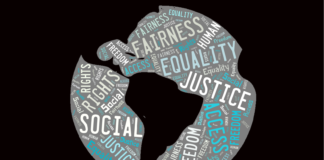Tag: social justice
Psychology, Personhood, and the Crisis of Neoliberalism: Jeff Sugarman on Theoretical...
Tim Beck interviews Jeff Sugarman on the psychology of personhood, the influence of neoliberalism on mental health, and the need for a more philosophically informed psychology.
Psychotherapy and Social Change: Mick Cooper on Counseling, Pluralism, and Progressive...
Javier Rizo interviews Mick Cooper on the intersection of psychotherapy and social transformation, the pluralistic approach to counseling, and the role of psychology in building a more just society.
Psychology is Not What You Think: An Interview with Critical Psychologist...
MIA’s Ayurdhi Dhar interviews Ian Parker about critical psychology, discourse and political action, and whether psychology has anything left to offer.
How Western Psychiatry Harms Alternative Understandings of Mental Health
An anthropological look at the Global Mental Health (GMH) movement suggests several ethical problems and contradictions in its mission.
Improving Mental Health Research through Community Participation
Clinical mental health research that includes community participation circumvents problems with traditional research.
The Emotional Impact of Critical Consciousness on Youth
Middle school students with critical consciousness of US politics and inequality exhibit more emotional distress and lower academic achievement.
The Power Threat Meaning Framework One Year On
The team that developed the Power Threat Meaning framework as a diagnostic alternative reflects on the response to the framework after one year.
Critical Psychologist On How Scientific Research Can Influence Public Policy
Critical participatory action research conducted on the higher education programs offered in prison leads to mobilized advocacy and shifts in public policy.
Does Psychotherapy Reproduce or Disrupt Neoliberal Capitalism?
Researchers explore neoliberal influences on interactions in psychotherapy and question whether the radical potential of psychotherapy can counter prevailing social systems.
Correcting Misconceptions of Trauma-informed Care with Survivor Perspectives
Trauma-informed approaches have the potential to promote recovery but must involve survivors and service-users to prevent the experience of retraumatization within psychiatric and mental health services.
What Does Social Justice Really Mean for Psychologists?
Without clarity and consensus around what social justice means, psychologists risk perpetuating injustices that undermine their stated mission.
Researchers Present Structural Competency Training Model for Psychiatrists
Researchers argue that a structural competency and social determinants of health approach must be made central to psychiatry training.
Researchers Call for Structural Competency in Psychiatry
Structural competency in psychiatry emphasizes the social factors shaping patient presentations and encourages physician advocacy.
Racism as a Public Health Threat
From Medical Xpress: Racism is a major public health issue that is correlated with physical and mental health problems including depression, high blood pressure, cardiovascular disease, breast...
Your Anxiety is a Political Issue
From Extra Newsfeed: Anxiety is a political issue, resulting directly from marginalization and structural inequality. The solution to anxiety is not self-help culture but activism...
Same-sex Marriage Laws Linked to Drop in Teen Suicide Attempts
From MinnPost: Laws legalizing same-sex marriage are associated with a significant drop in teen suicide attempts. In states that legalized same-sex marriage before June 2015, when...
Learnings from Earthworms: The Ecstasy of an Antipsychiatry “Breakthrough”
As an activist, you work for a long, long time seeing no signs of change, and perhaps you are tempted to throw your hands up in despair. However, very, very often something utterly profound is shifting beneath the surface.
A Racist Movement Cannot Move
Our movement is just as racist (and sexist, and classist, and transphobic, etc.) as any other. There are many reasons why this remains so, yet all of it co-exists alongside the fact that people of color are substantially more likely to be given what are seen as the harshest psychiatric labels, subjected to force, and injured or killed.
The Difficulty of Challenging Deeply Personal Narratives
We should all tell our stories, not to prove other people wrong or to shame them, but to offer an alternative narrative. A narrative that recognizes that symptoms of mental disorders are cries for help, means of communication, and normal responses to an unjust society.
Picking Our Battles in the War on Prejudice and Discrimination
At Destination Dignity on World Mental Health Day, we marched, several hundred strong, from the Capitol Reflecting Pool to the Washington Monument — right down the middle of iconic Pennsylvania Avenue! As we marched, I heard the chant “Feel the reign of dignity—it feels like freedom!” and joined in.
Optimizing Children’s Mental Health is a Social Justice Issue
I can spout off the most amazing strategies for optimizing children’s mental health, such as feeding them real food, making sure they get lots of unstructured playtime in natural spaces, loving them unconditionally, and guiding them to the intersection of their skills and passions. But if a parent doesn’t have the financial/emotional/physical/mental means to act on these strategies, it is for naught.
It’s Time for a Revolution Within the Revolution: Coming Out of...
If we are to demand justice for our brothers and sisters in hospitals, jails and community-based programs, then we must demand justice for women, Blacks and other POC who are being discriminated against. We cannot continue to be silent while 50% of us are regulated to the back, and not allowed space at the table. Our fellow community members are wounded by the silence. We expect and are now demanding to be treated better.
It’s as Bad as You Think: The Gap Between the Rich...
Many of us in the U.K. are mad - mad with anger at the injustice and cynicism of a political system that is turning the gap between rich and poor into an unbridgeable chasm. Mad with anger because the most vulnerable in society are now paying the price for a political ideology - neoliberalism - with their lives. We are mad and angry because they are blamed for failings that are not of their making, but which originate in the system under which we live. 'Psychological' assessments, online cognitive behavioural therapy (CBT) and other forms of 'therapy' are being used to force unemployed people with common mental health problems back to work. Mental health professionals responsible for IAPT (Improving Access to Psychological Therapies) have been relocated to help 'assess' and 'treat' claimants.
Defeating Goliath: Mental Health is a Social Justice Issue, and People...
While I have lived just a few miles away from the Capitol for the last fifteen years, I have been unsure about getting involved in legislative advocacy. I’ve been intimidated by the complexity of the legislative process, and more inclined to leave it up to others who I perceive as having more experience than me. And honestly, I haven’t felt very hopeful about effecting change. My cynicism had turned to “learned helplessness.” And then along came a mental health bill so destructive, so regressive, that I had to step out of my uncomfortable comfort zone.
It’s About the Trauma: How to Truly Address the Roots of...
Representative Tim Murphy is a psychologist who proposes unsatisfactory solutions to our most pressing social problems. In a "shockingly regressive" piece of legislation known as the “Helping Families in Mental Health Crisis Act of 2013” (H.R. 3717), he proposes to expand the highly controversial practice of Involuntary Outpatient Committment (IOC) for persons with serious mental illnesses. But that approach is not the answer, as documented in a fact sheet authored by the National Coalition for Mental Health Recovery:





























